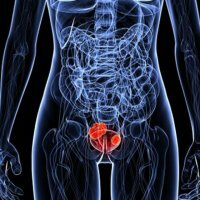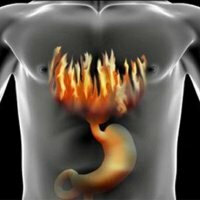Anus Cancer: Symptoms, Diagnosis and Treatment
 Anal oncology is rare. Anus cancer is a serious oncological disease that spreads from the upper border of the inner posterior sphincter to the skin anal line. This article will be more detailed about this disease.
Anal oncology is rare. Anus cancer is a serious oncological disease that spreads from the upper border of the inner posterior sphincter to the skin anal line. This article will be more detailed about this disease.
Some confuse the cancer of the anus and the oncology of the large intestine. However, these are two different diseases. Cancer of the anus occurs only in 1,5% of all cases of oncology of the large intestine. For one hundred thousand patients, only one falls ill. As statistics show, men are more prone to this disease than women. Most often, men of non-traditional orientation become ill, especially in the presence of HIV.If the disease is identified at the initial stage, the prognosis for recovery is favorable.
Causes of anus cancer
Anus cancer can occur for various reasons. However, this kind of oncology has not been fully studied by doctors, so it is being investigated to this day. Some doctors believe that the degree of risk is increased by such diseases as:
- rectal and genital warts;
- presence of human papillomavirus in the body;
- fistula( anal fissure);
- smoking, which provokes the development of any cancer;
- constant irritation of the anus due to the expansion of hemorrhoidal veins, anal sexual contact, the formation of cracks in the anal passage, leukoplakia;
- the age period from 50 years;
- HIV infection;
- decreased immunity and autoimmune diseases.
Provoke cancer of the anus can be irradiated during therapy of oncological diseases of the genitourinary system, prostate, rectum.
Symptoms of anus cancer
Like all other cancers, anus cancer has been in a latent form for a long time without any symptoms. However, very often with cancer of the anus appear symptoms at the first stage. This is due to the fact that in the anus is a lot of nerve plexuses and blood vessels.
The initial symptoms of anus cancer are as follows:
- sensation of an alien object in the anus;
- soreness in the act of defecation;
- itching in the anal area;
- appearance of blood or veins in feces.
Unfortunately, many patients do not pay attention to such symptoms. Most often people think that this is a manifestation of anal fissures, hemorrhoids or other diseases. Of course, the above symptoms can be symptoms of other diseases, but joking with this is not worth it. It is better to visit a doctor and conduct a checkup to make sure that this is not an oncology.
If the above symptoms remain for a long time without treatment, the cancer passes to another stage, on which there are already other symptoms:
- the appearance of purulent or mucous discharge from the anus;
- defecation disorder( decreased or more frequent urge);
- after stool, the feeling that the stools have not completely come out;
- increase in the proximal lymph nodes.
With oncology, the anus can spasmodic, causing serious discomfort. Sometimes in the anus begin to form sluggish sores. At later stages, there are signs of cancer intoxication: thinning, lack of appetite, fatigue, drowsiness and the like.
Diagnosis of anus cancer
At the initial stage, anus cancer can be detected only if the patient himself consults a doctor and undergoes the necessary examination. Since the symptoms at the initial stage are very similar to the symptoms of other diseases, you will have to pass specific tests. This will help determine if there is a tumor. If there is, it will be necessary to establish its character: benign or malignant. Sometimes polyps in the anus cause the same symptoms.
The doctor performs an external examination and asks the necessary questions, identifying the risk factors. Then various tests are assigned:
- Finger examination of the rectum - this is the easiest way to determine the state of the rectal area. This method will assess the mucous and anal canal tissues, identify and detect the disease.
- Anascopy - with the help of an anascope examine the anus and the lower section of the rectum.
- Recto-manoscopy is a procedure for endoscopic examination of the rectum and sigmoid colon. This device is inserted up to 30 cm deep in the anus. Rectal ultrasound. Assigned to identify tumors that can not be detected by palpation.
- X-ray of the colon helps to detect polyps, fistulas and tumors.
- MRI of the rectum with contrast allows you to more clearly examine the tumor and the patient's condition.
- Biopsy with histological evaluation of tissues. The doctor takes an element of the tumor tissue and determines its malignancy.
If the diagnosis is confirmed, the doctor will conduct additional tests that will help determine the presence of metastases, the size of the tumor and its exact location.
Treatment of anus cancer
Treatment of anus cancer depends directly on the condition of the patient. Treatment is selected based on the results of the survey. The doctor takes into account the size and location of the tumor, the degree of neglect, age and health of the patient.
- Surgical treatment - this method surgically removes all neoplasms, as well as nearby tissues. This method of treatment is considered the most effective, but it is very traumatic. Sometimes the tumor must be removed only by cutting the abdominal cavity. After the operation, the patient is inserted an ostomy - an artificial device for removing stool. Therefore, doctors try to avoid operations and do them only as a last resort.
- Radiation treatment allows you to destroy cancerous tumors, while maintaining the functionality of the anal sphincter. In addition to the tumor itself, the nearest lymph nodes are irradiated to reduce the risk of recurrence.
- Chemotherapy is used to reduce the tumor and prevent its proliferation. At a chemotherapy use special preparations. This method of treatment is often combined with other methods.
Prognosis after treatment
The prognosis after treatment directly depends on the stage at which the disease was detected and when it was started to be treated. Also much depends on the professionalism of the doctor. Modern therapeutic methods of treatment can guarantee a long-term remission. If no metastases were found, in 70% of cases the patients live more than five years.
Complex therapy with a combination of chemotherapy and radiation provides a cure in 80% of patients. However, this is provided that the tumor size does not exceed 30 mm. Relapse occurs in about 10% of patients.
To reduce the risk of recurrence, you need to see a proctologist physician after recovery.
Prevention of anus cancer
To reduce the risk of this disease, you need to take precautions:
- use condoms for sexual intercourse;
- to avoid damage to the anal mucosa, rectum and at the time of treating such problems;
- monitor food and prevent constipation;
- maintain immunity and abandon bad habits.
It is worth regularly visiting the proctologist - at least once a year. This will help during the detection of the disease and cure it.



